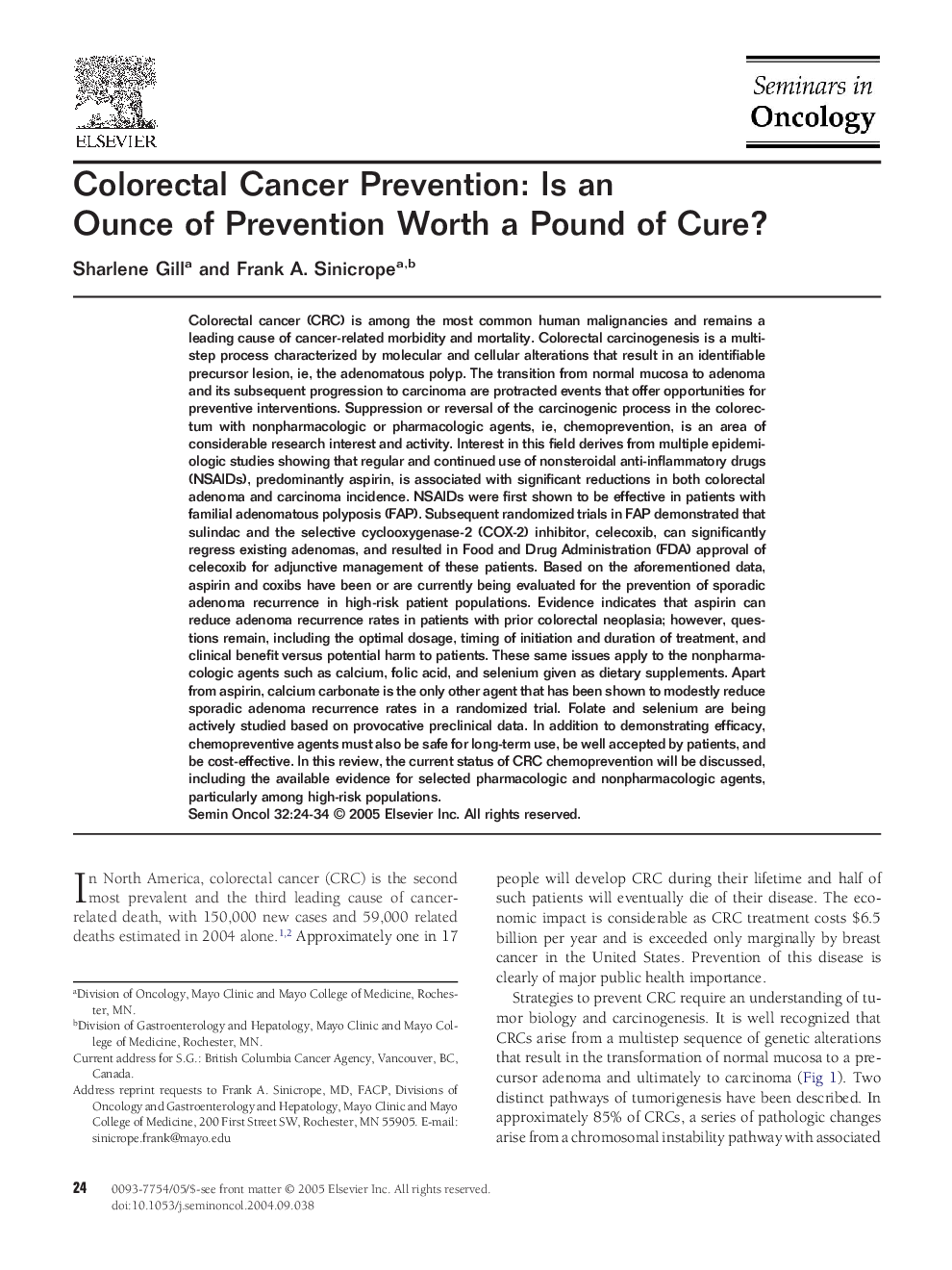| کد مقاله | کد نشریه | سال انتشار | مقاله انگلیسی | نسخه تمام متن |
|---|---|---|---|---|
| 10924468 | 1091296 | 2005 | 11 صفحه PDF | دانلود رایگان |
عنوان انگلیسی مقاله ISI
Colorectal cancer prevention: Is an ounce of prevention worth a pound of cure?
دانلود مقاله + سفارش ترجمه
دانلود مقاله ISI انگلیسی
رایگان برای ایرانیان
موضوعات مرتبط
علوم زیستی و بیوفناوری
بیوشیمی، ژنتیک و زیست شناسی مولکولی
تحقیقات سرطان
پیش نمایش صفحه اول مقاله

چکیده انگلیسی
Colorectal cancer (CRC) is among the most common human malignancies and remains a leading cause of cancer-related morbidity and mortality. Colorectal carcinogenesis is a multistep process characterized by molecular and cellular alterations that result in an identifiable precursor lesion, ie, the adenomatous polyp. The transition from normal mucosa to adenoma and its subsequent progression to carcinoma are protracted events that offer opportunities for preventive interventions. Suppression or reversal of the carcinogenic process in the colorectum with nonpharmacologic or pharmacologic agents, ie, chemoprevention, is an area of considerable research interest and activity. Interest in this field derives from multiple epidemiologic studies showing that regular and continued use of nonsteroidal anti-inflammatory drugs (NSAIDs), predominantly aspirin, is associated with significant reductions in both colorectal adenoma and carcinoma incidence. NSAIDs were first shown to be effective in patients with familial adenomatous polyposis (FAP). Subsequent randomized trials in FAP demonstrated that sulindac and the selective cyclooxygenase-2 (COX-2) inhibitor, celecoxib, can significantly regress existing adenomas, and resulted in Food and Drug Administration (FDA) approval of celecoxib for adjunctive management of these patients. Based on the aforementioned data, aspirin and coxibs have been or are currently being evaluated for the prevention of sporadic adenoma recurrence in high-risk patient populations. Evidence indicates that aspirin can reduce adenoma recurrence rates in patients with prior colorectal neoplasia; however, questions remain, including the optimal dosage, timing of initiation and duration of treatment, and clinical benefit versus potential harm to patients. These same issues apply to the nonpharmacologic agents such as calcium, folic acid, and selenium given as dietary supplements. Apart from aspirin, calcium carbonate is the only other agent that has been shown to modestly reduce sporadic adenoma recurrence rates in a randomized trial. Folate and selenium are being actively studied based on provocative preclinical data. In addition to demonstrating efficacy, chemopreventive agents must also be safe for long-term use, be well accepted by patients, and be cost-effective. In this review, the current status of CRC chemoprevention will be discussed, including the available evidence for selected pharmacologic and nonpharmacologic agents, particularly among high-risk populations.
ناشر
Database: Elsevier - ScienceDirect (ساینس دایرکت)
Journal: Seminars in Oncology - Volume 32, Issue 1, February 2005, Pages 24-34
Journal: Seminars in Oncology - Volume 32, Issue 1, February 2005, Pages 24-34
نویسندگان
Sharlene Gill, Frank A. Sinicrope,